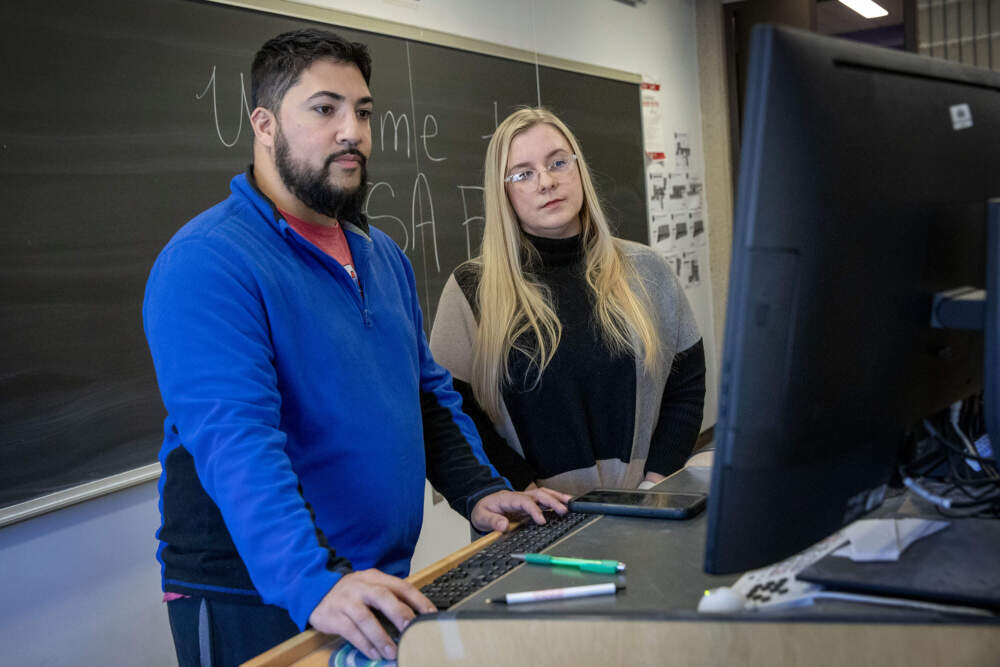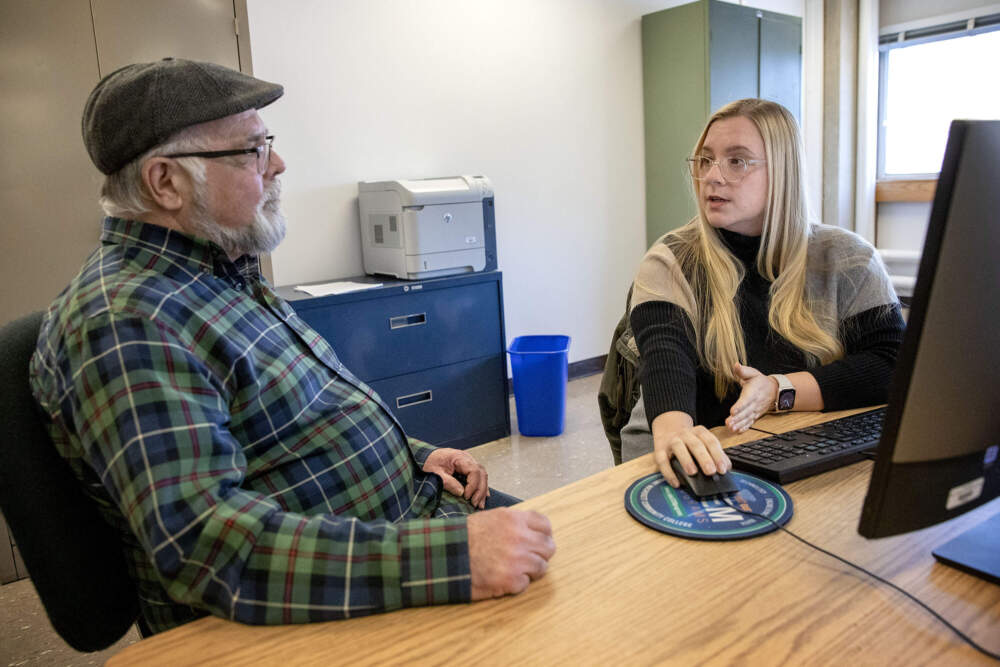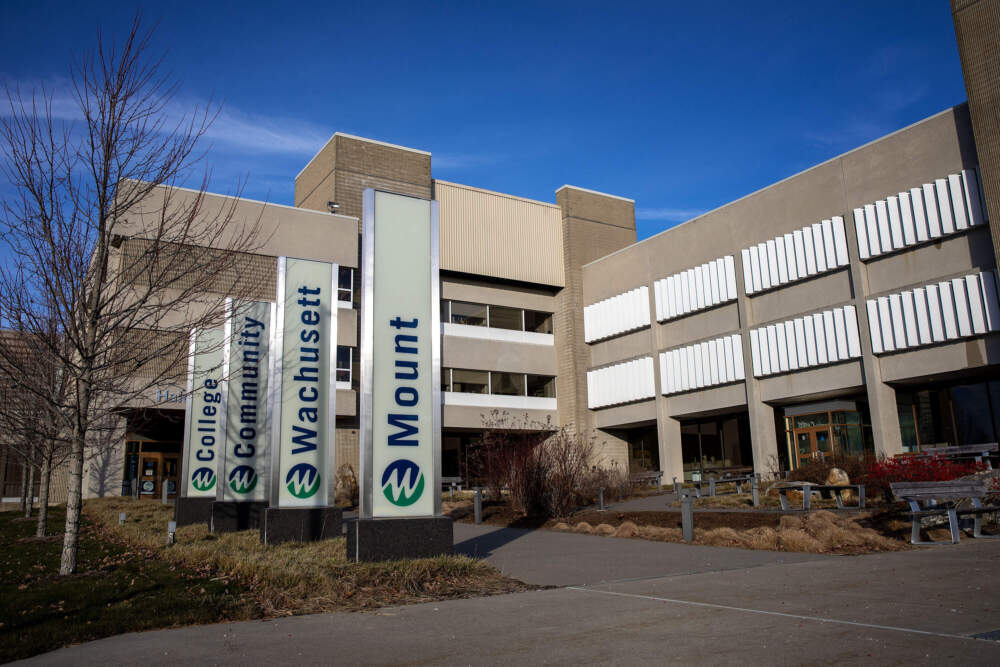Advertisement
Community college aid pushes enrollment — and strains staffs
Resume
Fernando Garcia-Rodriguez wrote "welcome" in big letters on the chalkboard. It was December, and the community outreach counselor for Mount Wachusett Community College was about to host a federal financial aid session for prospective students.
In years past, attendance at these sessions was pretty low. But that's changed.
"It’s been busier and there’s been a lot more adults coming," Rodriguez said.
That's due, in part, to a new state program called MassReconnect, which covers community college tuition and fees for residents 25 and older who don't have a college degree and enroll in at least six credits per semester in an approved program of study.
The program, which launched last August as part of a state initiative to make college more affordable, has boosted interest in the state's 15 community colleges, according to registrar staff.
And it's eased the financial strain for students like Ryan Soulliere. The 27-year-old studies chemistry at Mount Wachusett. Because MassReconnect also offers an allowance for books and supplies, he's been able to scale back hours at his job.
"That helps me be able to get my homework done more reasonably. It’s less stressful," said Soulliere, who hopes to eventually become a teacher.
Enrollment at Mount Wachusett was up by 12.4%, or 365 students, last fall compared with the year before.
Overall, the entire state community college system saw an enrollment increase of 8% in the fall.
"People [are] saying how life changing this money will be for them," said Jason Marsala, dean of enrollment services at North Shore Community College, where enrollment was up 10% last fall from a year ago.

But while community college leaders are buoyed by the rise in enrollment, they said they're concerned about the pressure it creates on their enrollment and financial aid departments. Marsala's office is short-staffed and has been for several years. With so many additional applications, his staff is balancing heavier workloads.
"I want to be 100% clear that these are all wonderful programs," Marsala said. "However, if you’re the person who has to make all the adjustments and fix all the accounts and follow all the money, it’s made your life super difficult right now."
Students are still receiving financial aid packages on time, but his staff is burning out, he said. And if he loses more people the effect could bleed into student experience.
'Didn't expect such a response'
The idea behind MassReconnect began on the gubernatorial campaign trail when it was touted by then-candidate Maura Healey.
At the August 2023 launch of the $20 million initiative, the governor said the program would be a "huge competitive advantage for Massachusetts" since it "elevates a workforce" and would attract employers to the state.
MassReconnect is one of several new programs aimed at making in-state college free or more affordable. Last year, state officials rolled out an expansion of MassGrant Plus, which ensures that the cost of tuition, fees, books and supplies are covered for low-income students attending state college or university. That expansion now significantly reduces tuition and fees for middle-income students as well.
Senate president Karen Spilka more recently proposed making community college in Massachusetts free for all by this fall, regardless of age or income status.
That focus on affordability seems to have had an effect; all 15 community colleges seeing enrollment increases last fall.
Advertisement
"Much of that has to do with the information that's come out about MassReconnect," said Marcia Rosbury-Henne, Mount Wachusett's enrollment dean. Other factors could include a strong economy and the fact the pandemic has receded, she said.
At MassBay Community College, enrollment is up by 13.8%.
"We didn’t expect such a response," said President David Podell. "But we are delighted to have it."
There was also a 6.3% increase at Bunker Hill Community College. Meanwhile, the state’s four-year colleges and UMass system saw overall enrollment declines, though not as steep as prior years.
"...if you’re the person who has to make all the adjustments and fix all the accounts and follow all the money, it’s made your life super difficult right now."
Jason Marsala
Many schools across Massachusetts have tight workforce resources right now, according to Nate Mackinnon, the executive director of the Massachusetts Association of Community Colleges. For some, that's due to past declining student enrollment; other schools lost long-time workers who were seeking a career with better pay after the pandemic.
"We do not have deep benches anywhere, and that’s partially because we don’t have deep resources," he said. "We are scrappy operations. Everybody wears multiple hats at every one of our colleges. And so, when you have big influxes of students, those hats become even heavier."
The other challenge facing staff is keeping track of all of the state’s financial aid programs. MassReconnect is a "last dollar" program, which covers whatever tuition is left over after federal financial aid and other scholarships kick in.
Heather Ruland, director of student financial services at Mount Wachusett Community College, said processing student financial aid applications can be confusing for her staff because of the slew of other similar programs. And many of them are relatively new, including MASSGrant, MASSGrant Plus, MASSGrant Plus Expansion, Mass Nursing, High Demand, ECE and DCF.
"When [the state financial aid directors] got together to talk about MassReconnect the term was coined, 'last dollar fight club,' " Ruland said.
It’s not always clear which funding stream a student is most eligible for — and that can hold up the financial aid process.
Ruland said she's consulting with state higher education leaders to simplify the system.
For now, though, Mount Wachusett Community College has hired temporary workers to assist the financial aid and enrollment staffers. Middlesex Community College is shifting employees to help out in departments that are stretched thin.

Noe Ortega, the state commissioner of higher education, said he's aware of the added burdens on community colleges right now.
When the state launched MassReconnect, colleges were given about $100,000 of one-time funding to help market the program and deal with administrative backlogs. Still, Ortega said, more funding is needed.
"This is a year of learnings, I would say," Ortega said. "What we need to pay close attention to is what kind of capacity are we going to need to build out. Because we want to live in this new reality [of increased enrollment] for some time."
Ortega said he’s requested for more funding for the community college system in the next fiscal budget. He also wants to invest in student support staffing, like academic counselors, so that when students do enroll in MassReconnect, colleges can help support them where it matters most: completing their degree.
This segment aired on January 22, 2024.
